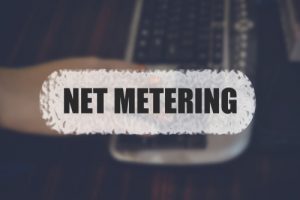 Net Metering – How It Works
Net Metering – How It Works
Net metering is the most common way to monetize energy production from solar and other renewable energy sources. It is mandated in 38 states and Washington D.C. In net metering, excess energy generated by your home’s solar system is sent back to the grid and credited. This credit can be rolled over to your next bill, just like cell phone minutes!
What Is Net Metering?
Net metering is a program that allows utility customers who have on-site renewable energy generation (like solar) to export the excess electricity they generate back to the grid. It’s a smart way to balance your power bill and reduce your carbon footprint. Most states have some form of net metering rules, though some have more stringent requirements than others. In most states, you’ll need to have a solar system connected to the grid in order to receive credits from the utility for any electricity you produce. Some states also offer “avoided cost” net metering, where you’ll get credit for the amount of electricity the utility saves by not having to provide it to you. This can be a big win for homeowners, but it’s a tricky deal for utility companies!
How Does It Work?
The most common type of net metering is the buy all/sell all model. In this scenario, you send all of your excess solar energy to the grid and don’t directly consume it from your home, but instead store it in the form of banked energy credits. And you might be wondering if you could get paid for the extra power you send to the grid. Well, while you may not be able to get money for it (in most cases), you will get an energy credit at the retail rate from your utility. This is the best way to get the most out of your solar system, and it will likely lead to a lower overall energy bill.
What Are The Benefits Of Net Metering?
Getting net metering credits is a good way to reduce your utility bills and make your solar system even more affordable. It’s especially helpful during the winter when power rates are higher from heating costs and you need to run your home for longer periods. However, there are some things to consider before you decide to take advantage of the net metering option. For one, it can save you money in the long run if you live in an area where the weather isn’t ideal for solar. It also helps you recoup your investment faster because it increases the amount of electricity that your solar system can produce during the day. In addition, some states offer full retail net metering, which can speed up your payback period significantly. It’s important to check whether your state has a net metering program before you get started.
What Are The Disadvantages Of Net Metering?
While net metering is undoubtedly a great way to save money on your energy bill and reduce your impact on the environment, there are, however some disadvantages to this system. The first is that it can be costly for homeowners to install batteries to store excess solar energy. Another downside is that it can be challenging for utility companies to schedule power generation. This is because solar generation varies with the amount of sunlight that is available at any given time and depends on the region in which you live.
Got questions about whether net metering is right for you? Be sure to contact our professional home builders here at Healthy Communities to learn more!
